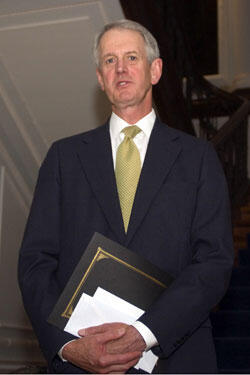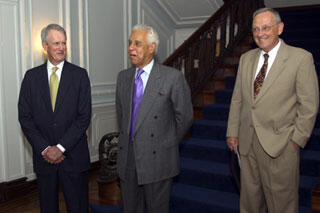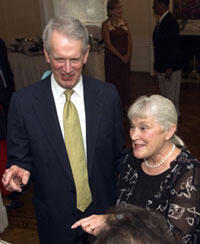June 22, 2006
Top administrator bids farewell to VCU
Tenure ends distinguished career in public service
Share this story

His last Friday on the job, Paul Timmreck once again assumed the role of “Incident Commander.” Power was suddenly lost at the Siegel Center, where thousands were gathered for a high school graduation. VCU Police, facilities managers and news services staff were mobilized under his direction, as head of the university’s incident response team, to deal with the emergency.
With a laugh, Timmreck shrugged off the irony that the opportunity to leave VCU with a full, uneventful week was lost. “This is a 24-7 job, and it should be. It keeps things exciting,” he said. But in a bit more somber tone, he admitted that it is “a job that you can’t ever leave — it stays with you.”
After 10 years as VCU’s chief finance and administrative officer, Timmreck is retiring from the university as senior vice president for Finance and Administration. It’s a huge job with tremendous responsibilities for the overall operating functions of the university — budget, facilities, human resources, police and security and information technology.
“Paul has meant so much to us the last 10 years, from the fiscal stability to the physical looks of the university,” says VCU President Eugene Trani. “He has done a wonderful job.”
Trani credits Timmreck with dramatic improvements in the fiscal and administrative services provided to the university. The list is long.
Timmreck oversaw the development of facilities important to VCU’s transition to a residential university, including a doubling of student housing, additions to the Student Commons, construction of the nationally acclaimed student dining facility and improvements designed to create a pleasant and inviting campus environment such as the pedestrian walkways at Shafer Court and Linden Plaza.
He was instrumental in securing funding for the new life sciences building and millions of dollars for an overhaul of the major building systems in Sanger Hall on the MCV Campus and Hibbs Hall on the Monroe Park Campus. Most recently, he guided the land acquisition and development of the new Monroe Park Campus Addition, which in a year will be home to a new School of Business, and expanded School of Engineering, the VCU Adcenter, residential colleges and a parking deck.
Timmreck says VCU certainly is a different place today than it was when he took the job 10 years ago. “When Dr. Trani approached me about the job, I drove around the university, and couldn’t help but think that VCU deserves better,” he says. “I’m proud of the staff that we’ve brought on who saw the opportunity and have the talent to take the vision and make it a reality.”
The physical improvements to the university are dramatic, and, as university leadership says, the result of brilliant fiscal management under Timmreck’s direction.
It hasn’t been easy. Trani has praised Timmreck for guiding VCU through a national recession and state budget cuts that reduced the amount of state support to the university by 25 percent. Despite the budget cuts, Trani says, VCU was able to enhance services to students, faculty and staff, as well as to affiliated organizations and neighboring communities. Now with improved state support, those initiatives are being enhanced.
Timmreck’s tenure at VCU caps a 31-year career of distinguished public service in Virginia.

He came to Virginia in 1975 to take a position with the Joint Legislative Audit and Review Commission – JLARC. His talents were quickly recognized and he moved on to become staff director of the Senate Finance Committee, the first person to hold such a position, and the state budget director in the administrations of governors Baliles and Robb. Timmreck then served as Secretary of Finance under Virginia governors George Allen and L. Douglas Wilder. During the Wilder administration, Virginia twice was recognized as the best fiscally managed state in the nation.
Timmreck’s colleagues say his integrity, intelligence and work ethic have allowed him the rare opportunity to serve administrations across political lines — and with distinction.
Timmreck is humble about his successes, saying “It’s a real kick when I think that I came to Virginia to work for JLARC and ended up working for four governors.”
Trani says VCU has greatly benefited from Timmreck’s reputation in the governor’s office and the General Assembly. “Because of Paul’s credibility and integrity, it has been easier to work with state government. Everyone respects him,” says Trani.
Timmreck’s dedication to public service is rooted in coming of age as a student at the University of Michigan during the 1960s.
“It was a tumultuous period for a lot of people — the Vietnam war, the civil rights movement, the assassinations of President Kennedy, Bobby Kennedy and Martin Luther King, Jr.,” Timmreck says. “It had a great impact on me and gave me a higher calling to make things better.”
Timmreck joined the Peace Corps after graduating from the University of Michigan with undergraduate and master’s degrees in public administration, and was sent to Caracas, Venezuela. He spent two years there that changed his life, in more ways than one.
He told Richmond Times-Dispatch reporter Gary Robertson in an article last year that the experience exposed him “to the upper crust of society, partying with politicians, business leaders and the nation’s greatest heroes, bullfighters. But that he also dipped into depths of society, riding through the streets with street sweepers and listening to the concerns of laborers who worked on the garbage trucks.”
These experiences, he said, helped to draw him out of an introverted personality. This was important for two reasons upon returning home to Michigan.
Timmreck says that when he got off the plane from Caracas, it was raining, snowing and sleeting all at the same time, and he vowed he was not going to live in Michigan anymore. He stayed long enough, though, to have a blind date, and six months later, he was married.

Paul and Jenny just celebrated their 35th anniversary — the same day as the power outage at the Siegel Center, which allowed for some reflection on the future of VCU — and his future.
He will always be concerned about the side of the job that seems to have weighed most heavily on him, the safety and security of the campuses. Following the tragic events of September 11, 2001, Timmreck was quick to recognize the need for a more structured process for responding to campus emergencies and provided strong leadership in overseeing the development of VCU’s emergency preparedness plan.
He went on to direct VCU’s incident response team, and has led the university through several high-profile emergencies such as Hurricane Isabel, the RAMZ Hall fire, Tropical Storm Gaston and the Taylor Behl tragedy.
“We are a huge institution with thousands of people in an urban environment, and there are always going to be emergencies. As it is with every university, we are always going to be facing the challenges of crime,” Timmreck says.
However, he is confident in the team remaining to deal with all of the challenges and carry on the vision, and he is bullish on the future of VCU. Timmreck says that the administrative team has never been stronger — “they are a formidable pool of talented individuals. Everywhere I look I see the tremendous accomplishments of a talented team. It has been a privilege to work with them.”
Timmreck will continue to work with them in some capacities. He will remain director of the Virginia Executive Institute, a leadership program for state executives offered by VCU’s Wilder School for Government and Public Affairs.
Timmreck also serves as chair of the Virginia Retirement System Board, a $47 billion enterprise.
He will take more time to be with Jenny and visit with his children, Emily, 30, and Mark, 27. Most of all, he will pursue his passion — fly fishing.
“There’s a certain energy and dynamism that are part of an urban institution. I’m fond of the wilderness and never calmer than when I’m on the water. Serenity is when I’m in a drift boat,” Timmreck says. “It’s the contrasts that make it nice, which is why we’ll continue to live in the Richmond metro area.”
And, Timmreck says he will continue to watch the progress at Virginia Commonwealth University. “I feel a kinship with the mission of this place, having been a first-generation college graduate.
What I will miss most are the people and meaningful teamwork to make a better place.”
The feeling is mutual. “This has been a wonderful decade,” says Trani. “We will miss Paul.”
Subscribe to VCU News
Subscribe to VCU News at newsletter.vcu.edu and receive a selection of stories, videos, photos, news clips and event listings in your inbox.










